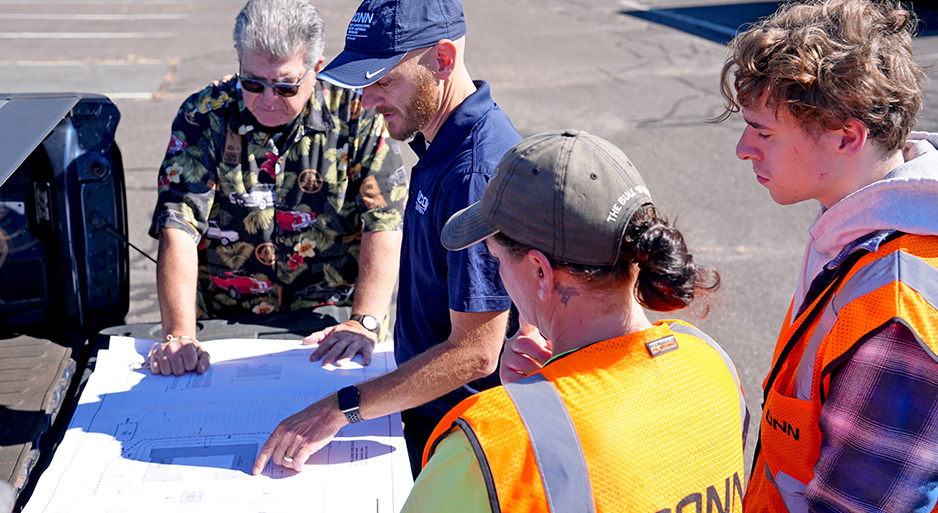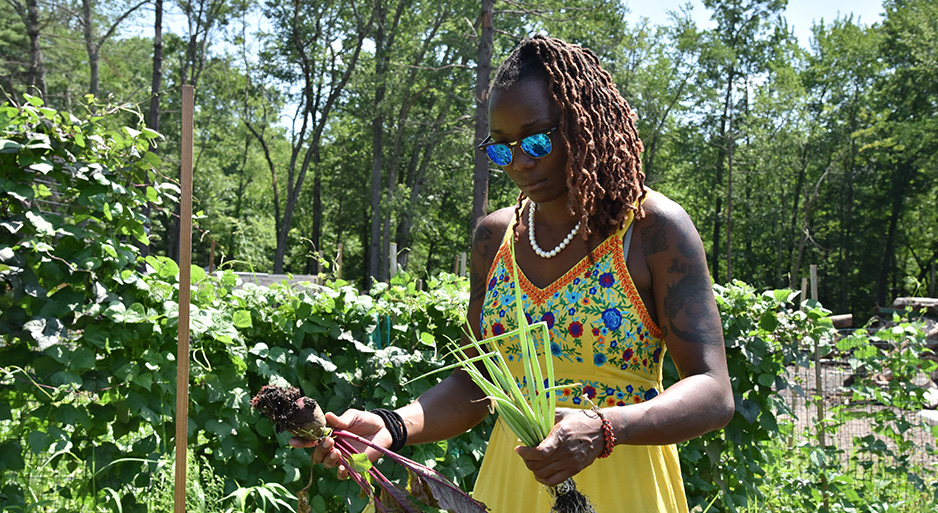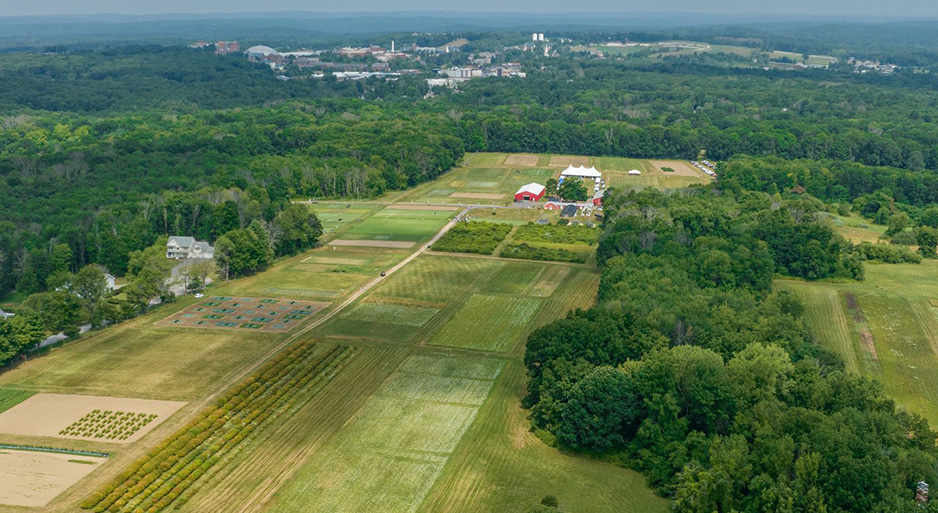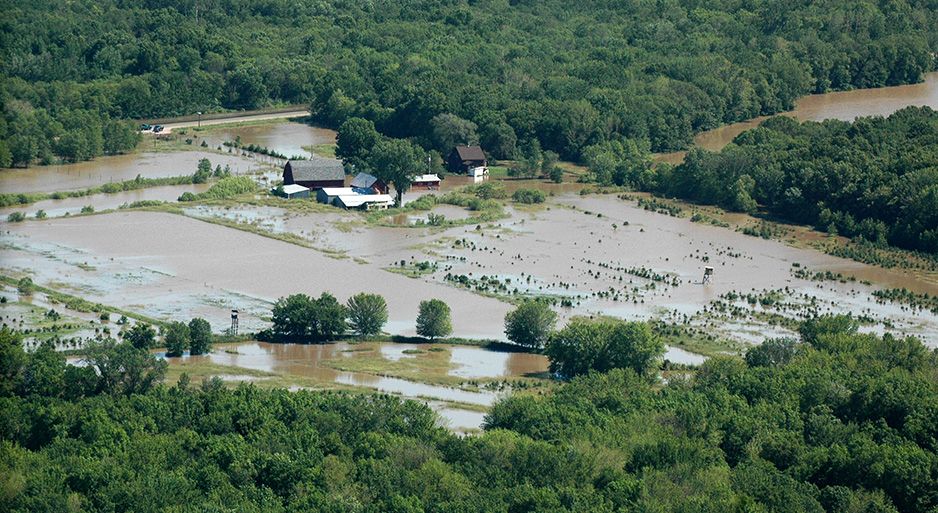
Extension Express
Fall 2023
Also in this Edition: Holiday Food Safety | UConn 4-H | Master Gardener Program | Welcome New Professionals!
With Connecticut, For Connecticut
UConn Extension is Everywhere
Amy Harder, UConn Extension Associate Dean, College of Agriculture, Health and Natural Resources
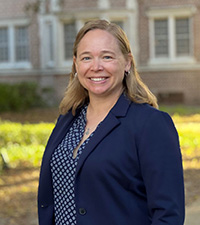
As Connecticut’s only land-grant university, a federal designation founded in the belief that education should be accessible to all, UConn is charged with three mission areas: teaching, research, and Extension. It is our privilege as UConn Extension to provide leadership for the mission area that conducts nearly all its work off-campus and where people live. Every day, our educators and staff feel a profound sense of responsibility to engage with individuals, families, farms, communities and more to jointly identify problems impacting our social, economic, and environmental well-being and then explore how the resources and expertise of UConn can be applied to create locally appropriate and culturally relevant solutions. For example, many of our programs address agriculture and food, and food safety is a large component of those. We explore food safety and holiday gatherings in this newsletter. We also introduce you to new team members, explore Extension’s statewide land use training, and provide an update on UConn’s fruit orchards.
On behalf of the UConn Extension system, I want to express my appreciation and gratitude for your ongoing interest and support of our efforts to make our state the best place to live. Our work is dedicated to working with Connecticut, for Connecticut. I hope you enjoy reading the Fall newsletter.
Training Land Use Planners for a Better Future
Article by Stacey Stearns
Populations keep increasing but there isn’t a way to create more land. In Connecticut, there is a constant tension between development and environmental needs. This tension exists throughout the Northeast and in other populated areas. Society is late in addressing land use planning, but the problems are fixable through positive action.
“The biggest issue or crisis we are facing is the lack of comprehensive, systemic planning, which leads to sprawl, overdevelopment, and otherwise inefficient land use development patterns.”
“We have not paid sufficient attention to our existing buildings and infrastructure and continue to fund development in greenfields instead of prioritizing, through planning, policy, and investment, development where we already have existing roads, sewer lines, water mains, and similar infrastructure,” said Renata Bertotti, an assistant extension educator.
 The Land Use Academy, an Extension program in UConn’s Center for Land Use, Education and Research (CLEAR) provides land use decision makers in Connecticut with practical education. It’s a 20-year-old program that teaches communities to balance land use policies in a sustainable way. Bertotti joined the UConn Extension team this summer and leads the Land Use Academy.
The Land Use Academy, an Extension program in UConn’s Center for Land Use, Education and Research (CLEAR) provides land use decision makers in Connecticut with practical education. It’s a 20-year-old program that teaches communities to balance land use policies in a sustainable way. Bertotti joined the UConn Extension team this summer and leads the Land Use Academy.
All land use commissioners are required to have four continuing education credits by January 1, 2024, and many participate in the Land Use Academy to fulfill the requirements. This fall, a series of weekly workshops were offered in conjunction with the Councils of Governments on various topics.
Bertotti plans to offer more topical sessions in 2024, including on climate adaptation, while maintaining the core programs that the Land Use Academy is known for. These topical sessions are always popular with land use officials and volunteers and incorporate needed procedural education too.
“The planning process also depends on who is involved, funding, and zoning processes,” Bertotti concluded. “It’s really important; we are in such a great position to educate people about how they can make a difference to all three over time.”
Fact sheets are available at s.uconn.edu/publications.
Read the full article at: s.uconn.edu/lua
Leaders of Color in Conservation
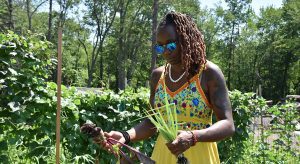 This program launched in Connecticut in 2023. UConn Extension, in partnership with a BIPOC-led organization, E&G Community Builders implemented the Leaders of Color in Conservation (LOCC) Training Project. Over the summer, eight individuals received training and mentoring in conservation planning and common practices on small farms. In turn, each worked with three BIPOC farmers to identify conservation goals, identify and prioritize natural resources issues and goals, and introduce them to programs available through the Natural Resources Conservation Service.
This program launched in Connecticut in 2023. UConn Extension, in partnership with a BIPOC-led organization, E&G Community Builders implemented the Leaders of Color in Conservation (LOCC) Training Project. Over the summer, eight individuals received training and mentoring in conservation planning and common practices on small farms. In turn, each worked with three BIPOC farmers to identify conservation goals, identify and prioritize natural resources issues and goals, and introduce them to programs available through the Natural Resources Conservation Service.
The project was funded by USDA-NRCS. Resources are available for new and beginning farmers at newfarms.uconn.edu.
Read the full article at: s.uconn.edu/leading
Re-establishing UConn’s Fruit Orchards
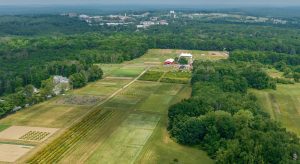 UConn has a long history as an agricultural college and used to be a destination for fruit production research, extension, and education. After a decades-long hiatus, Evan Lentz ’19 ’22 (CAHNR) is reviving UConn’s fruit orchards on a 6-acre site at the University’s Plant Science Research Farm. Lentz, an extension educator specializing in commercial fruit crop production, has plans to share the fruits of his labor with Husky Nation and Connecticut residents.
UConn has a long history as an agricultural college and used to be a destination for fruit production research, extension, and education. After a decades-long hiatus, Evan Lentz ’19 ’22 (CAHNR) is reviving UConn’s fruit orchards on a 6-acre site at the University’s Plant Science Research Farm. Lentz, an extension educator specializing in commercial fruit crop production, has plans to share the fruits of his labor with Husky Nation and Connecticut residents.
Outreach efforts will be enhanced with this orchard serving as a site for stakeholder demonstrations as well as a place to hold Extension events, including field days and production workshops, and also engage with the local community.
The fully fenced orchard will be located at UConn’s Plant Science Research Farm. The highly diversified and high-tech orchard will include tree fruit, small fruit, and vineyard grapes. Kiwi berry, honey berry, sea berry and aronia—all niche crops—are also being considered.
Rebuilding the UConn Fruit Orchard is an ongoing process with several phases. A full land evaluation is underway. In spring 2024, the orchard will break ground to begin planting the first trees and bushes. Crops will be expanded, with the first harvest anticipated in 2025.
Throughout this process, the orchard will serve as an educational asset to students and community stakeholders alike—providing insight, resources, and how-to videos on orchard planning, varietal selection, and establishment.
Lentz joined UConn Extension and the Department of Plant Science and Landscape Architecture in March 2023. His expertise is in commercial fruit production with an emphasis on small and niche crops, Integrated Pest Management (IPM), farm risk management, plant nutrition, and other related topics.
Learn more about re-establishing UConn’s fruit orchards at s.uconn.edu/fruit-orchard.
Food Safety and Holiday Eating
Article by Indu Upadhyaya, Ph.D.
 Holiday gatherings bring families and friends together, to spread more joy and happiness. While the merriment begins around Thanksgiving and continues until the New Years’, the food during holiday buffets, the party trays, the turkey, and other delicacies remain the main attraction of gathering. But be aware that a well-meaning and much anticipated get together can easily turn sour if the food is not safely prepared, served, or stored. Food safety should be diligently taken care of, especially during holidays, as in the delight of the season, negligence could cause serious health consequences.
Holiday gatherings bring families and friends together, to spread more joy and happiness. While the merriment begins around Thanksgiving and continues until the New Years’, the food during holiday buffets, the party trays, the turkey, and other delicacies remain the main attraction of gathering. But be aware that a well-meaning and much anticipated get together can easily turn sour if the food is not safely prepared, served, or stored. Food safety should be diligently taken care of, especially during holidays, as in the delight of the season, negligence could cause serious health consequences.
Most people who get sick from eating contaminated food, might have mild illness and recover early, however susceptible populations can see lasting effects or even death. The Centers for Disease Control and Prevention (CDC) estimates that each year roughly one in six Americans get sick from contaminated food. Approximately 128,000 are hospitalized, and 3,000 die due to foodborne diseases across the country. These data are out of reported cases, thereby not including cases of undocumented, non-reported stomach indigestions and/or mild diarrhea or vomiting. The real number of patients getting sick from foodborne illnesses is still unknown and hard to predict.
What you can do this season is control food contamination in your own home and community? Start with these simple steps aligning with USDA holiday food safety guidelines.
Lastly, don’t prepare food if you are sick or showing symptoms or if you recently had such symptoms. Many foodborne illnesses are transmitted unknowingly by human error, by a food preparer who had these symptoms. If you are ill, let someone else do the cooking so you can have a safe and enjoyable meal with your family and friends.
Food Safety
Here are the eight “always” of food safety to help everyone stay healthy during the holiday season:
- Always wash your hands.
- Always clean and sanitize.
- Always thaw the frozen meat/turkey safely.
- Always separate food items to avoid cross contamination.
- Always cook thoroughly.
- Always follow the two-hour rule.
- Always keep warm food warm and cold food cold.
- Always store leftovers appropriately.
UConn 4-H
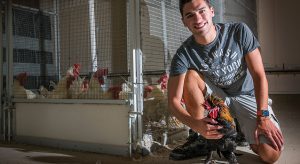 UConn 4-H offers youth ages five through 18 the opportunity to explore areas of interest in the environment and nature, robotics, caring for animals, gardens, photography, public speaking, and more. Youth also develop civic engagement, leadership, and workforce development skills.
UConn 4-H offers youth ages five through 18 the opportunity to explore areas of interest in the environment and nature, robotics, caring for animals, gardens, photography, public speaking, and more. Youth also develop civic engagement, leadership, and workforce development skills.
4-H programs include club-based activities in municipalities statewide, afterschool programs, camps, competitions, events, and national trips. The club-based programs culminate with a 4-H fair each year when projects are evaluated.
Learn more about enrolling a child in 4-H, volunteering, or supporting the program at s.uconn.edu/4-H.
Master Gardener Program
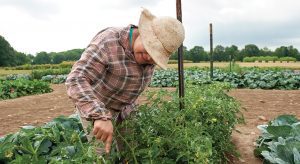 Graduations this fall recognized the 2023 UConn Extension Master Gardener interns who completed training, and we’re excited to welcome them into our extended network of certified Master Gardeners statewide. This year’s classes were held at the Bartlett Arboretum in Stamford, the Haddam office, the Farmington office, the Brooklyn office, and online through our Bethel office. Preparations are underway for our 2024 classes which begin in January. More information on Garden Master classes that are available to anyone, the Fundamentals of Home Gardening online courses, and getting your garden-related questions answered are available at mastergardener.uconn.edu.
Graduations this fall recognized the 2023 UConn Extension Master Gardener interns who completed training, and we’re excited to welcome them into our extended network of certified Master Gardeners statewide. This year’s classes were held at the Bartlett Arboretum in Stamford, the Haddam office, the Farmington office, the Brooklyn office, and online through our Bethel office. Preparations are underway for our 2024 classes which begin in January. More information on Garden Master classes that are available to anyone, the Fundamentals of Home Gardening online courses, and getting your garden-related questions answered are available at mastergardener.uconn.edu.
Shelter from the Storm
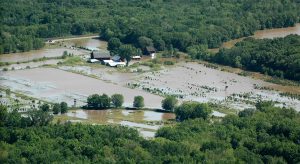 2023 was a rainy year for Connecticut, and this continuous weather pattern caused flooding issues for agricultural operations, residents, and municipalities. Sheltering from the storm and preventing damage became a priority as precipitation records were exceeded. Data from the National Weather Service shows that in all categories from four to 12-month records, our annual precipitation was anywhere from 108% to 172% higher than normal for Connecticut counties.
2023 was a rainy year for Connecticut, and this continuous weather pattern caused flooding issues for agricultural operations, residents, and municipalities. Sheltering from the storm and preventing damage became a priority as precipitation records were exceeded. Data from the National Weather Service shows that in all categories from four to 12-month records, our annual precipitation was anywhere from 108% to 172% higher than normal for Connecticut counties.
UConn Extension has resources to support agricultural producers, municipalities, residents, and others affected at s.uconn.edu/flooding. You can also sign up for mobile weather alerts by visiting weather.gov and CT Alerts. Anyone in a disaster area can use the ready.gov disaster recovery resources.
Extension Welcomes New Professionals
Many new team members joined us since January and are working in communities statewide to help address critical issues.
- Renata Bertotti - Assistant Extension Educator, Land Use Planning, Haddam Office
- Talia Clarke - Educational Program Assistant, Sustainable Food Systems, Vernon Office
- Margaret Cozens - Sea Grant Visiting Assistant Extension Educator, Long Island Sound Study (LISS) Outreach Coordinator, Avery Point Campus
- Maryann Fusco-Rollins - Assistant Cooperative Extension Educator for UConn 4-H – Tolland County, Vernon Office
- Michael Gilman - Sea Grant Visiting Assistant Extension Educator for Aquaculture, Avery Point Campus
- Bonnie Kegler -Assistant Extension Educator, UConn 4-H - Windham County, Brooklyn Office
- Srikanth Kodati - Assistant Extension Educator, Pesticide Safety & Crop Protection, Vernon Office
- Evan Lentz - Assistant Extension Educator, Fruit Production and IPM, Storrs Campus
- Hannah Morillo-Galindo - Educational Program Assistant, EFNEP, North Haven Office
- Maggie Ng - Educational Program Assistant, Vegetable and Hemp programs, Vernon Office
- Owen Placido - Sea Grant Visiting Assistant Extension Educator, Nature-Based Approaches to Resilience, Avery Point Campus
- Brenda Sanchez - Educational Program Assistant, EFNEP, Bethel Office
- Sarah Schechter - Sea Grant Visiting Assistant Extension Educator, Sustainable and Resilient Communities, Avery Point Campus
- Joanna Woodward - New London County Master Gardener Coordinator, Norwich Office
- Heather Zidack - Educational Program Assistant, UConn Home & Garden Education Center, Storrs Campus
